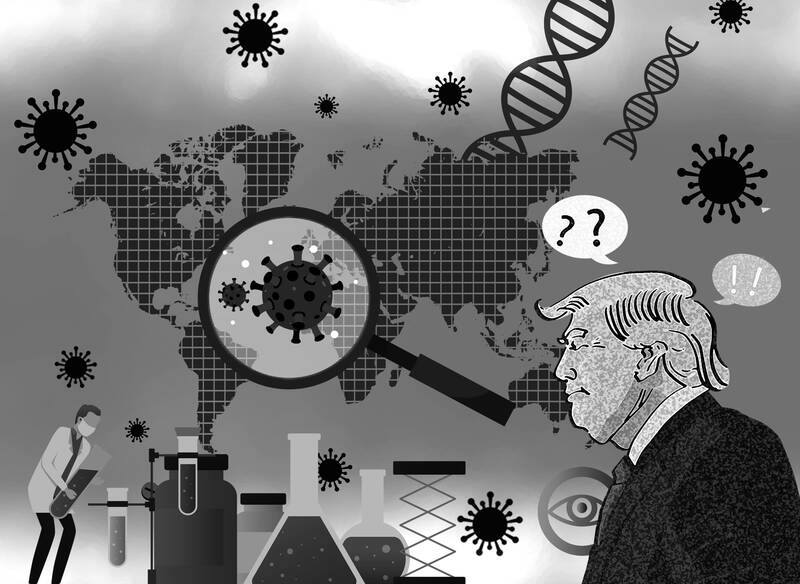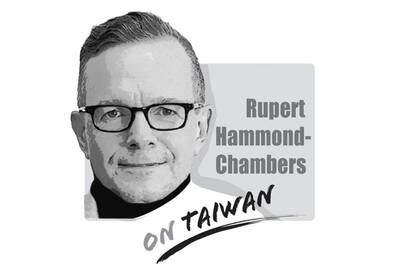The COVID-19 pandemic killed an estimated 7.1 million people worldwide, causing global life expectancy to decline by 1.6 years between 2019 and 2021. It disrupted economies, destroyed livelihoods, and strained social cohesion in many countries. Yet no one has been held accountable for it. Will US president-elect Donald Trump change that?
Five years after the emergence of SARS-CoV-2 (the virus that causes COVID-19), we still do not know where the pathogen first arose. Did it emerge naturally in the wet markets of Wuhan, China, or did it escape from the nearby Wuhan Institute of Virology (WIV), where studies into bat coronaviruses were under way?
We do know that China’s government allowed what might have been a local outbreak to morph into a global health crisis. After the first COVID-19 cases were reported in Wuhan, Chinese President Xi Jinping’s (習近平) regime censored reports about the disease and hid evidence of human-to-human transmission for weeks. Meanwhile, travel to and from Wuhan was allowed to continue unhindered.

Illustration: Louise Ting
Unlike the Muslim gulag in Xinjiang or naval-base construction in the South China Sea, Chinese authorities could not conceal the “novel coronavirus” for long, nor could the rest of the world ignore it once the secret was out. So many people contracted COVID-19 so quickly that hospitals were soon overwhelmed, leaving many victims to be treated in tents.
China’s government then shifted from concealment to damage control. State media reframed the crisis in Wuhan as a story of successful recovery, while touting unrealistically low mortality rates. Meanwhile, Xi thwarted international efforts to initiate an independent forensic inquiry into COVID-19’s genesis, which he claimed would amount to “origin-tracing terrorism.” The only “investigation” he allowed was a 2021 joint study with the WHO that China controlled and steered.
While Trump, who was president for the first few months of the pandemic, often highlighted the link between China and COVID-19, his successor, US President Joe Biden, effectively let China off the hook. Less than a week after his inauguration, Biden produced a presidential memorandum urging federal agencies to avoid mentioning the virus’ geographic origins.
Biden’s goal was to stem a rise in bullying, harassment and hate crimes against Asian-Americans and Pacific Islanders. The toxicity of the US’ partisan politics meant that pushing back against racism — which Trump and his cohort often stoked — also meant shutting down any discussion of China’s role in causing the crisis. Social media platforms, mainstream media and some prominent US scientists (who hid their conflicts of interest) also aided the suppression of debate about COVID-19.
The partisan divide over whether to investigate China’s responsibility for COVID-19 persists to this day. Just last month, Democrats challenged a 520-page report — produced by the Republican-controlled US House Select Subcommittee on the Coronavirus Pandemic — which concluded, after a two-year investigation, that the virus likely escaped from the WIV, faulting the report’s methodology. So, while some US government agencies — including the Department of Energy and the FBI — have given credence to the lab-leak theory, there remains no consensus in Washington.
Failure to get to the bottom of where COVID-19 originated might not only allow China to evade responsibility; it would also weaken the world’s ability to prevent another global pandemic. However, there is reason to hope that the incoming Trump administration would revive the search for an answer. Beyond Trump’s own willingness to point the finger at China, some of his cabinet picks — notably, Robert F. Kennedy Jr, as secretary of health and human services and Jay Bhattacharya as director of the US National Institutes of Health (NIH) — challenged prevailing narratives about COVID-19 (albeit sometimes in dangerous ways).
An effective investigation would require considerable transparency from the US. The NIH, the US government’s medical-research agency, was funding studies on bat coronaviruses at the WIV as far back as 2014. The NIH knew that the work was risky; it was being done in China precisely because the US has stricter rules governing “gain-of-function” research, which involves modifying a biological agent’s genetic structure to confer on it “new or enhanced activity,” such as increasing a pathogen’s transmissibility or virulence. The NIH continued to fund research at the WIV even after multiple US State Department cables flagged the lab’s lax safety standards, stopping only after the pandemic began (when it also removed the description of gain-of-function research from its website).
Making matters worse, we now know that the WIV has been carrying out classified research on behalf of the Chinese military since at least 2017. A 2021 US State Department fact sheet acknowledged that some US funding for civilian research could have been diverted to secret Chinese military projects at the institute.
One rule of thumb in forensic investigations is to “follow the money,” so the Trump administration should start by disclosing the full extent of US funding of coronavirus research in China. However, investigators would also have to “follow the data,” meaning that the US would have to disclose the results of the research it funded in Wuhan, which was part of a collaborative US-China scientific program.
Holding China accountable for its role in the pandemic is only the first step. To safeguard humanity’s future, the Trump administration would also have to address a more fundamental issue: Dangerous “gain-of-function” research is still taking place in some labs in China, Russia and the West. The genetic enhancement of pathogens represents the greatest existential threat to humankind ever produced by science, even greater than nuclear weapons. By tightening rules on such activities — or, ideally, prohibiting lab research that could unleash a pandemic — Trump would leave an important positive legacy.
Brahma Chellaney, Professor Emeritus of Strategic Studies at the New Delhi-based Center for Policy Research and Fellow at the Robert Bosch Academy in Berlin, is the author of Water, Peace, and War: Confronting the Global Water Crisis.
Copyright: Project Syndicate
Having lived through former British prime minister Boris Johnson’s tumultuous and scandal-ridden administration, the last place I had expected to come face-to-face with “Mr Brexit” was in a hotel ballroom in Taipei. Should I have been so surprised? Over the past few years, Taiwan has unfortunately become the destination of choice for washed-up Western politicians to turn up long after their political careers have ended, making grandiose speeches in exchange for extraordinarily large paychecks far exceeding the annual salary of all but the wealthiest of Taiwan’s business tycoons. Taiwan’s pursuit of bygone politicians with little to no influence in their home
In a recent essay, “How Taiwan Lost Trump,” a former adviser to US President Donald Trump, Christian Whiton, accuses Taiwan of diplomatic incompetence — claiming Taipei failed to reach out to Trump, botched trade negotiations and mishandled its defense posture. Whiton’s narrative overlooks a fundamental truth: Taiwan was never in a position to “win” Trump’s favor in the first place. The playing field was asymmetrical from the outset, dominated by a transactional US president on one side and the looming threat of Chinese coercion on the other. From the outset of his second term, which began in January, Trump reaffirmed his
It is difficult not to agree with a few points stated by Christian Whiton in his article, “How Taiwan Lost Trump,” and yet the main idea is flawed. I am a Polish journalist who considers Taiwan her second home. I am conservative, and I might disagree with some social changes being promoted in Taiwan right now, especially the push for progressiveness backed by leftists from the West — we need to clean up our mess before blaming the Taiwanese. However, I would never think that those issues should dominate the West’s judgement of Taiwan’s geopolitical importance. The question is not whether

In 2025, it is easy to believe that Taiwan has always played a central role in various assessments of global national interests. But that is a mistaken belief. Taiwan’s position in the world and the international support it presently enjoys are relatively new and remain highly vulnerable to challenges from China. In the early 2000s, the George W. Bush Administration had plans to elevate bilateral relations and to boost Taiwan’s defense. It designated Taiwan as a non-NATO ally, and in 2001 made available to Taiwan a significant package of arms to enhance the island’s defenses including the submarines it long sought.